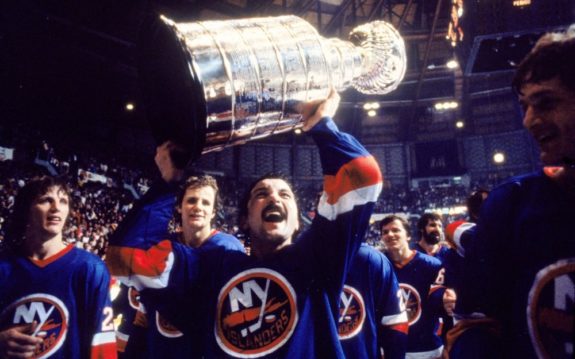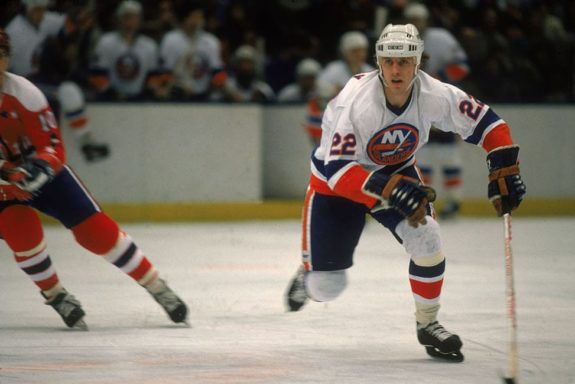Today, we turn back time to appreciate the life and career of New York Islanders’ great, Mike Bossy. He was a four-time Stanley Cup champion and one of the most prolific scorers in NHL history. Here is a look at the Hall of Fame right winger’s journey to the NHL and his life afterward.
A Star in the Making: Mike Bossy’s Childhood
Long before making his debut as a star for the Islanders, Mike Bossy was one of 10 children growing up in the Bossy household. He had four older siblings and four younger siblings, as he was the fifth child of Borden and Dorothy Bossy. His father, Borden, was of Polish descent and an avid hockey fan. As a result, he made a backyard rink for Mike and his five brothers. In his autobiography, Mike said, “The most fun I ever had growing up was playing a game in the backyard rink with my brothers.”
While growing up in the Ahuntsic community of Montreal, where the Montreal Canadiens were seen as royalty, the Detroit Red Wings were the family favorite in the Bossy household. Mike’s mother, Dorothy, even sent Red Wings legend Gordie Howe a birthday card yearly.
Junior Hockey Phenom
Minor Hockey Star
Bossy was phenomenal from the first game of organized hockey he ever played. According to his mother, he scored 23 goals in his first game. The future NHL star played in the 1969 Quebec International Pee-Wee Hockey Tournament for the Montreal C.J.M.S.
As Bossy moved along the minor hockey ranks, he began to catch the eyes of many junior hockey scouts. One man in particular, Paul Rougeau, took a keen interest in the talent and skill young Bossy was demonstrating. Rougeau, the head coach of the Laval Nationals from the Quebec Maritimes Junior Hockey League (QMJHL), had a plan for him to make his way to the Nationals by playing Midget and Junior B in Laval.
The Bossy family found a new home in Chomedey, a Laval neighborhood, to accommodate the development of his blossoming hockey career. While playing on the Chomedey Midget “AA” hockey team, his life was forever altered as he met his future wife, Lucie Creamer, who was the daughter of the rink manager and worked at the arena concession.
Bossy’s Ascension through the Junior Ranks
Following his Midget season in Chomedey, Bossy began playing junior hockey at 15 years old in the Metropolitan Montreal Junior B Hockey League for the Laval Satellites. He led the league in scoring with 58 goals and 64 assists, earning him a one-game tryout with the Nationals QMJHL team. That one-game tryout turned into four more seasons with the club.
Laval Nationals 1972-1977
After debuting as a 15-year-old with the Nationals, Bossy went on to have one of the most prolific careers in QMJHL history. In his first full season with the team, the gifted goalscorer put up incredible numbers, scoring 70 goals and 48 assists for 118 points in 68 games. He followed that up by scoring 84 goals and 65 assists for 149 points in just 67 games.
By his final season with the Nationals, Bossy was named the captain and posted his fourth consecutive 100-point season. He played 263 games for the Nationals scoring 309 goals and 223 assists for 532 points. His 309 goals are still a league record, and his 532 points sit ninth all-time in QMJHL history, just behind another notable Hall of Famer, Mario Lemieux.
There’s a New Boss in Town
In the 1977 NHL Draft, the New York Islanders landed an absolute steal by drafting Bossy 15th overall. He fell down the draft board as teams cited him as a one-dimensional player. Islanders’ legendary head coach Al Arbour is credited with persuading general manager Bill Torrey to select Bossy over Dwight Foster, who had led the Ontario Hockey League (OHL) with 143 points.

The Islanders’ decision to draft Bossy paid enormous dividends for the franchise as he went on to win the Calder Memorial Trophy as the NHL’s top rookie in the 1977-78 season. During his rookie season, he played on the Islanders’ top line alongside Bryan Trottier and Clark Gillies. The line became known as “The Trio Grande” and played a pivotal role in the Islanders’ dynasty years. Bossy also set a new rookie record in goal scoring by lighting the lamp 53 times, a record that stood until the 1992-93 season when Teemu Selanne scored an absurd 76 goals as a rookie.
The Dynasty Years
Islanders Win First Stanley Cup
The Islanders were gaining notoriety around the NHL and in 1980, they won their first Stanley Cup, beginning a truly amazing run. They famously went on to win four straight Stanley Cup championships, and Bossy played a huge role in each of them. During the 1980 Playoffs, he missed the first three games of the quarter-finals against the Boston Bruins, however, returned with a vengeance as he scored twice in his first game back. The Islanders played the Buffalo Sabres in the semifinals, and Bossy chipped in three goals and three assists to help push New York to the Stanley Cup Final. Bossy led all players in the Final with 11 points as the Islanders claimed their first championship.
50 in 50
As the Islanders set out to defend their first championship, Bossy was on a mission, becoming just the second player in NHL history to score 50 goals in 50 games. He hit the milestone in his 50th game of the season against the Quebec Nordiques, scoring his 50th goal with just 89 seconds left in the game. New York then made it back-to-back championships by defeating the Minnesota North Stars in the 1981 Stanley Cup Final. He also set records in the 1981 Playoffs as the leading scorer with 35 points in 18 playoff games.

Conn Smythe Winner
In the 1982 regular season, “Boss” posted a career-high 147 points scoring 64 goals and adding 83 assists. During the playoffs, he won the Conn Smythe trophy as the playoff MVP, scoring 17 goals and 10 assists for 27 points en route to the Islanders’ third straight Cup. Through their four championships, Bossy totaled 61 goals and 50 assists for 111 points in 72 games.
Bossy Hits the 60-Goal Mark for the 3rd Straight Season
The Islanders’ legendary sniper set another NHL record by becoming the first player to score 60 goals in three straight seasons. Bossy took home more individual hardware as he won the Lady Byng Memorial Trophy. The right winger finished the season with 60 goals and 58 assists for 118. He continued his elite offensive production during the 1983 Playoffs as the Islanders once again defended their status as champions. In 19 games, he scored 17 goals and 10 assists for 26 points. For the second consecutive season, the prolific goalscorer also notched the Stanley Cup-winning goal, becoming just the second player in league history to do so.
Bossy’s Late Career & Early Retirement
Bossy played four more seasons with the Islanders before chronic back problems ended his career at 30 years old. Through his 10-season career, the Islanders legend hit the 100-point mark seven times, including a run of six straight. The 1986-87 season would be the last for Bossy, and while he still posted 75 points in 63 games, the season was a big regression from his prior years on Long Island.
Related: New York Islanders’ Greatest of All-Time
Had it not been for Wayne Gretzky’s era of dominance, Bossy would have taken home much more individual hardware. He was the Lady Byng winner three times, the Calder winner and a Conn Smythe winner. One of the best natural goal scorers ever, he ranks first in NHL history scoring at .762 goals per game rate. Gretzky played in 1,487 games and scored 894 goals. Had Bossy played in the same amount of games and continued his rate of goal-scoring, he would have scored an incredible 1,133 goals. When it comes to the topic of best ever, his name deserves more recognition as he truly was the greatest goalscorer the NHL has ever seen.
Bossy was inducted into the Hockey Hall of Fame in 1991 and had his No. 22 retired by the Islanders in 1992.
Life After Hockey
Following his retirement, Bossy joined the hockey stick manufacturer Titan as their vice president and began his career in the broadcasting industry covering the Nordiques. He also worked for a radio station based out of Montreal. In 2006, he returned to the Islanders organization working with the front office and fan development. In 2014, he was hired on as a hockey analyst for MSG Networks before joining TVA Sports as a color commentator in Sep. 2015.

Sadly, on April 15, 2022, the hockey world lost Bossy as he succumbed to his battle with lung cancer. He left behind his wife Lucie and their two children. Bossy may be gone, but his legacy and impact on the game will never be forgotten. Rest in peace, Boss.
